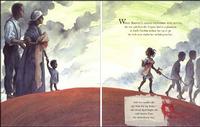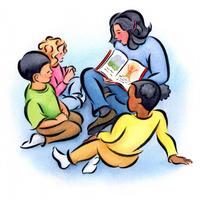#OneBookWednesday: Talking About the Civil War and Slavery with Kids
By Joy K.The United States has a rich history. We usually focus these accomplishments when learning about our history. I think Dan Brown said it best— “History is always written by the winners.”
But, what about those gray parts—those parts of our tainted history that we, as Americans, are not so proud of? Do the tragic events, such as the Trail of Tears, slavery, internment camps, or the Salem Witch Trials sound familiar? These periods of persecution, if mentioned at all, usually get brushed over during history class, as though they have no importance whatsoever. Yet these brutal events are catalysts for major changes!
As we enter into a One Book season that focuses on a very challenging period in our nation’s history, we must ask ourselves: How can we explain such horrifying events to children? How can a child relate to the past, especially when so much is changing in our current, daily lives?
It is important, before even talking with your child, to reflect on your own personal and family backgrounds and experiences. Children and families who have been directly affected by war and prejudice need and deserve special attention and support.
How and when this conversation occurs is your decision; however, it may be prompted by current events or topics discussed at school, either in class or with peers. Try to remain calm, and always listen to your child’s concerns. What you decide to share with your child should reflect his or her age and maturity level. Asking your child how he or she is feeling and listening to what he or she may already know about the event will make it easier to gauge what to share.
The most powerful tool we can use to help share these events and teach tolerance is books. Books are not only enjoyable but can be used to personalize various situations. Children especially learn by identifying with people. Feelings of seclusion, loneliness, and isolation are relatable to all of us. The One Book, One Philadelphia youth titles, Sounder by William H. Armstrong and Show Way by Jacqueline Woodson, portray African American children living in the nineteenth century South. Explaining slavery, racism, and segregation might be difficult to discuss, but these types of materials immerse a reader into the characters’ lives, showing us their thoughts, experiences, and perceptions, which help students make connections. Read together and discuss. Open dialogue is imperative, and books will open up a conversation with children without bombarding them with too much information.
The United States definitely has some awkward and uncomfortable moments. However, by using our most powerful instrument—books—to ignite an open discussion with a caring and trustworthy adult, we can definitely ensure understanding, tolerance—and, hopefully, peace.
Have a question for Free Library staff? Please submit it to our Ask a Librarian page and receive a response within two business days.


